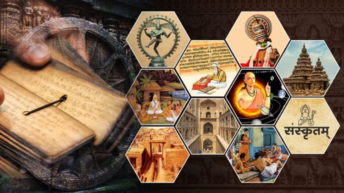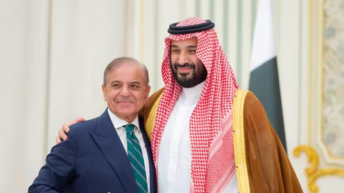
As West Asia lurches into an ever-widening conflagration, historical and religious shadows loom over Israel and Iran, two states divided by decades of enmity. Above and behind the well-publicized conflicting strategic interests and goals, theologically inspired memes about ‘God’s chosen People supported by the Indispensable Nation vs. the Axis of Resistance to the Great and Little Satans’ persist.
The Persian King of Kings Kouros, Cyrus for the Greeks, freed the Hebrews from Babylonian captivity and enabled them to return to Judea. Almost twenty-five centuries later, Israel was shocked by the fall of the Shah, Muhammad Reza Pahlavi, followed by the advent of the Islamic Republic in 1979. The last Iranian monarch occasionally criticised America’s ‘submission’ to the Jews but was a reliable friend to Tel Aviv. In contrast, his clerical successors have never failed to proclaim their commitment to Palestinian liberation and their hostility to the ‘Zionist entity’.
An ancient Arab prophetic adage states that the Mahdi won’t appear until Persian war horses drink in the Jordan again, in remembrance of the Jewish-assisted Sasanian conquest of the Holy Land in the early 7th century C.E.
The above historical references hint at the heavy symbolic legacy of the current conflict. Facing Israel, often called by American policy-makers a ‘US aircraft carrier’, permanently anchored in the Levant, Iran is the bulwark of Shi’ite Islam, with a long imperial legacy in the wider region and an eschatological tradition of martyrdom and Mazdean soteriology. Shi’ite religious leaders await the return of the Hidden Twelth Imam, and orthodox Jews expect the arrival of the Messiah ‘who will thrash them (the world’s rulers) with an iron rod’ (Psalms 2:9).
The two versions of salvation collide because according to Islamic prophecies, the Mahdi will go to Jerusalem and proclaim his rule from the Al Aqsa mosque whereas in the Jewish Apocalypse, the Messiah will reign on Mount Zion where the third temple will be built on the site of the present mosque. Fundamentalist Jews hold Palestinians to be like the Chananean tribes listed in the Torah for which there is no place in the Holy Land.
For orthodox Rabbis the Messiah’s advent is nigh, and the powerful, Russian-born but New York-based Chabad Lubavitch sect (1), among others, is preparing for that momentous event that will be preceded, according to the scriptures, by the ritual holocaust (slaughter and cremation) of a spotless red heifer (2) to usher in Armageddon: a universal bloody war.
The Chabad Lubavitch is highly influential in today’s Israeli politics and in US domestic and foreign policies. The late Lubavitch Rebbe (dynastic head) Menachem Mendel Schneerson entrusted Prime Minister Netanyahu several years ago with the task of preparing the coming of the future Ruler; he publicly asked him to accelerate the series of events expected to usher in the ‘Moschiah’s appearance, predicting that ‘Bibi’ would be Israel’s last secular head and would hand over the scepter to God’s Envoy (3).
Whereas Iran’s supreme guide, Ayatollah Khamenei’s mission is to steer the country in line with the expectation of the Mahdi’s return, the Lubavitch-inspired Israeli politicians believe that they must act to prepare the advent of the future divinely appointed Monarch. Netanyahu in his recent speech at the UN General Assembly quoted Prophet Samuel’s prophecy that ‘Israel will last eternally’. The indifference of Israeli decision-makers to international law and the objections of other governments, including their allies and the UN, can be understood from their theocratic perspective which places them above humanitarian conventions.
On the opposite side, Iran’s clerical leadership is pledged to defend the rights of Muslims over the third holiest shrine of Islam and to fight the colonisation and occupation of Palestine by ‘infidel’ settlers. The two positions appear incompatible and are leading to an all-out war that could turn nuclear and involve many other nations according to the Russian Jewish political scientist Evgeny Satanovsky. Similarly, the American geopolitician John Mearsheimer believes that no concessions can be expected from the Israeli-American alliance and that, consequently, Russia, Iran, China, and North Korea have come together to counteract the hitherto hegemonic US-led axis.
In recent weeks there has been a rapid succession of meetings between top Russian and Iranian leaders that signal growing military collaboration between the two nations as they prepare for the upcoming BRICS summit in Kazan in late October. Israeli Prime Minister Netanyahu’s secret visit to Moscow this last September may have been an attempt to dissuade Putin from giving Tehran advanced defensive systems, but the Kremlin’s position is unlikely to change. NATO and Israel are two cornerstones of US hegemony and the final destruction of West Asian states such as Lebanon and Syria by Israel would gravely damage Moscow’s influence, particularly in Iran and the Caucasus, even though there is a huge population of Russian origin in the Jewish state that must influence Putin’s decisions. Putin’s government views any attempt to ‘decapitate’ Iran’s government as a threat similar to the continuing Western endeavour to turn Ukraine into an anti-Russian bulwark.
Moscow is therefore concerned about the prospect of Iran being dealt a fatal military blow by the Israelo-American alliance as it would expose the Central Asian ‘soft underbelly’ to even greater inimical penetration and would strike at the core of BRICS and the SCO. Given that prospect, the deployment of Russian anti-missile systems such as the Murmansk and the S-400 in Iran, is proceeding apace, along with the infusion of Russian military engineers and advisers.
Israel and Iran both have far-flung transnational support systems. The Jewish state can rely on its worldwide network of Zionist billionaires, media moguls, Intelligence and clandestine action operatives, political fixers, and election influencers, supported by Christian neo-conservative Evangelicals in many Western countries. The ethno-religious affinities of many key US policymakers such as Secretary of State Antony Blinken, and many others with Israel (as also with Zelensky and his regime) are well known.
Outside of Russia and China, Iran counts on widespread Muslim and African popular support. It enjoys the sympathy of the international Left, and of quite a few anti-Zionist and anti-US Right Wing nationalist movements in Europe and the Americas where antipathy for ‘Jewish power’ is a muted but enduring sentiment.
The propaganda from the two sides is intense and far-reaching. The global economy would be an immediate victim of a wider and more direct conflict. Iran has its hands on the oil and gas spigots in the Gulf region and, if Israel were to strike energy production facilities, the world would overnight plunge into a financial and political crisis. Tehran’s missiles could blow up the pipeline that supplies much of Israel’s fuel while shutting down its seaports and damaging its petroleum and gas storage tanks in response to a major Israeli attack.
Given their respective assets, the two countries are resorting to different strategies. While Israel harks back to the days of the ‘Sicarii’ by covertly moving across the physical and cyber chessboard, knocking out the opponent’s key pieces, destroying its infrastructure, and going for ‘shahmat’ (killing the heads of Hamas, Hezbollah, and the Iranian government), Tehran’s game is closer to Chinese Go, gradually encircling and boxing Israel in through asymmetric attacks from various directions.
Usually, strategic space and time determine the outcome of war. Iran has plenty of both, because of its geography and history. Israel has little room at home and cannot sustain a high-intensity conflict for very long. Yet a quick resolution of any war with Iran seems impossible.
Whatever they do, none of the belligerents should push the other into a corner, thereby forcing it to take desperate measures whose catastrophic effects might well spread beyond anyone’s control.
References:
(1)https://en.wikipedia.org/wiki/Chabad
(2)https://www.middleeasteye.net/news/israel-practise-red-heifer-ritual-al-aqsa#:~:text=A%20group%20of%20religious%20Israelis,activists%20from%20the%20Temple%20Institute
(3)https://www.youtube.com/watch?v=EgeWVgNGeAA






Add comment